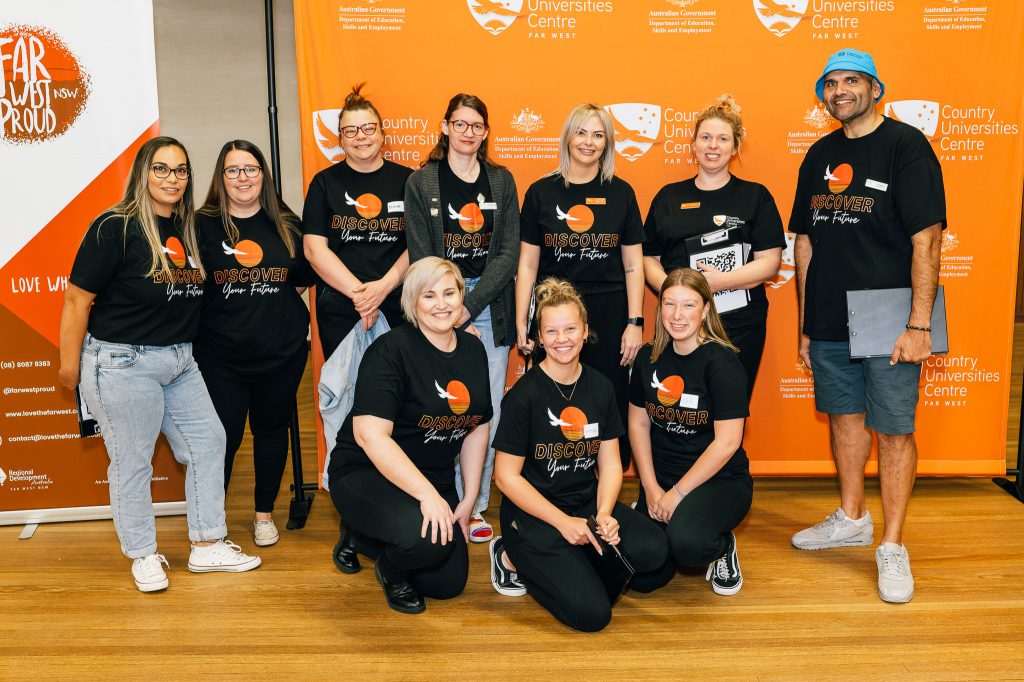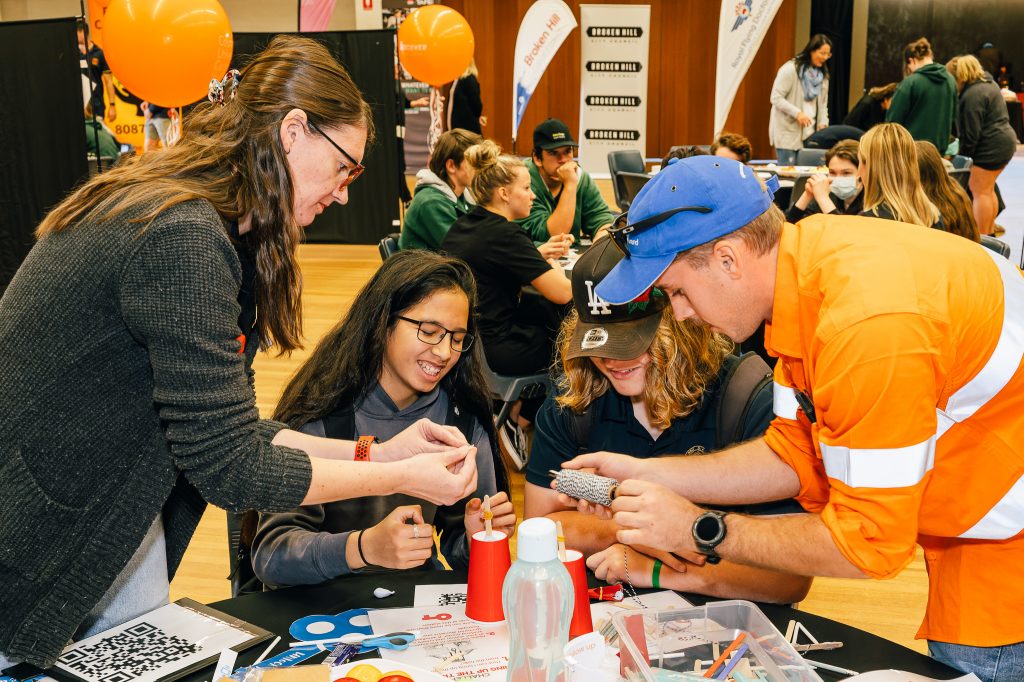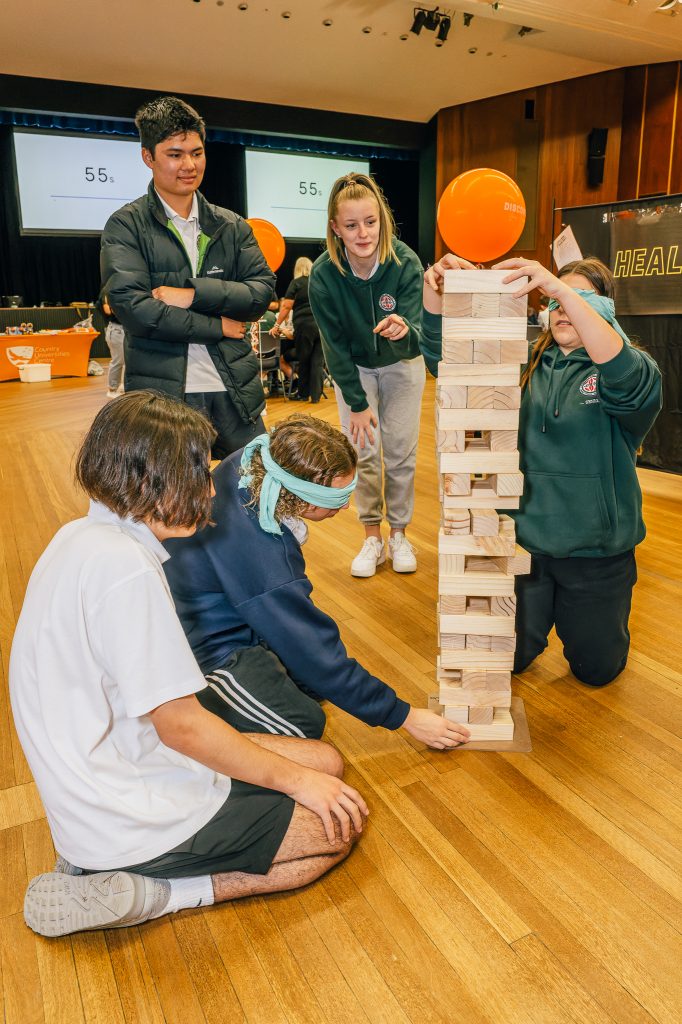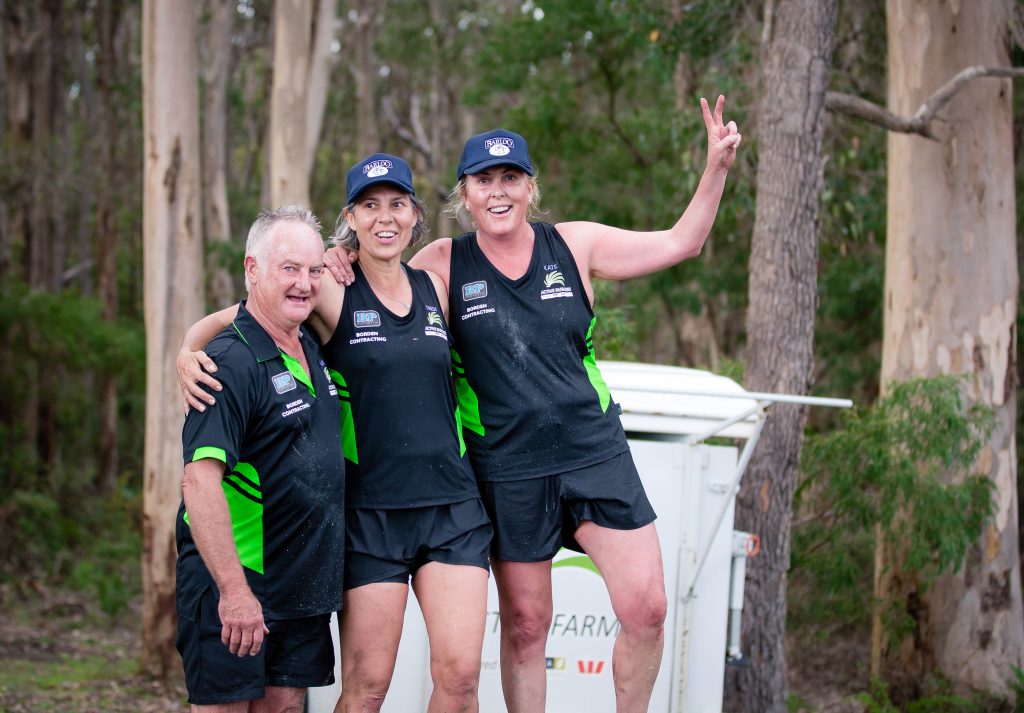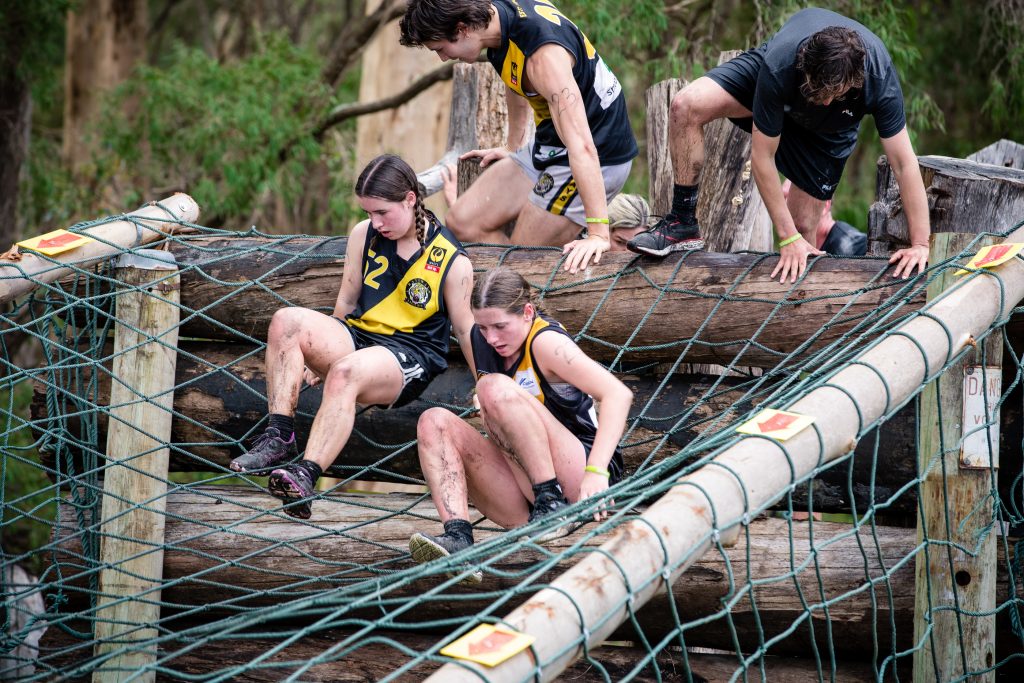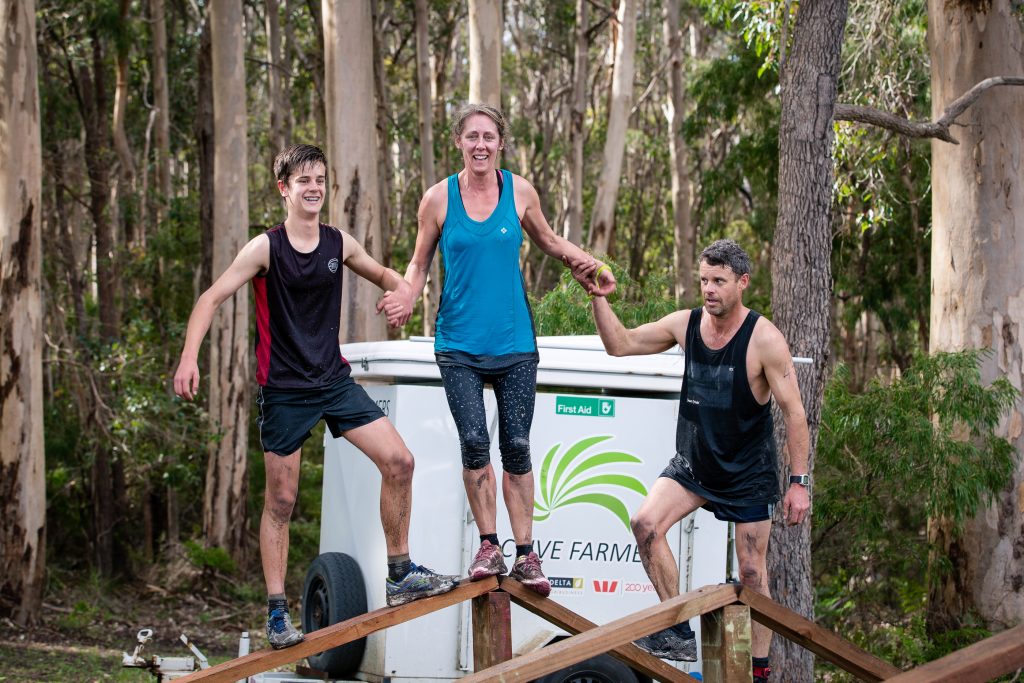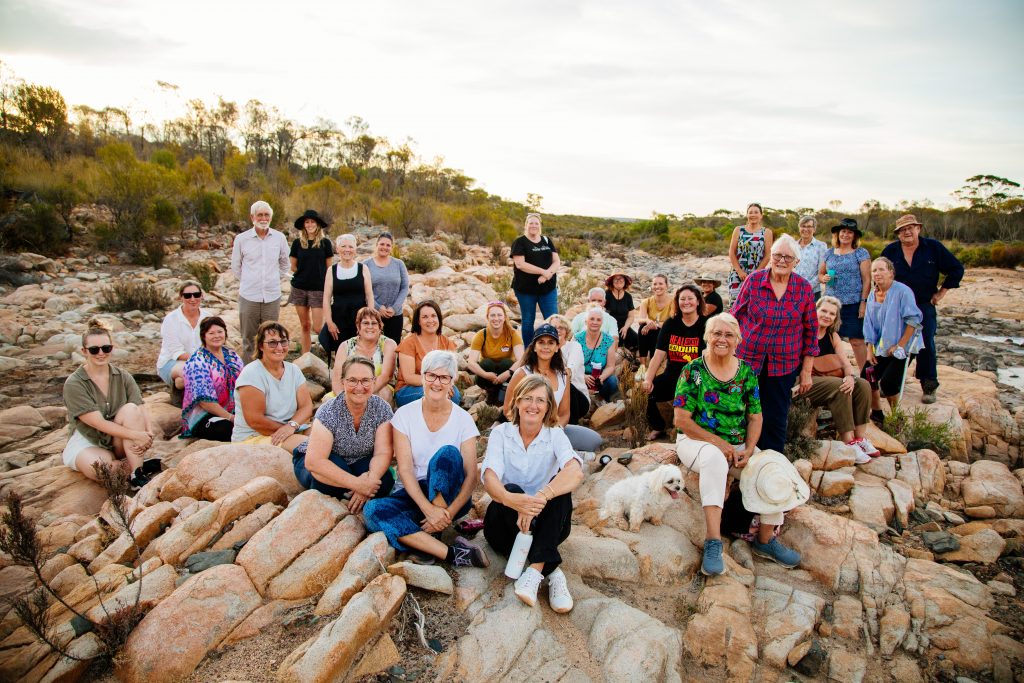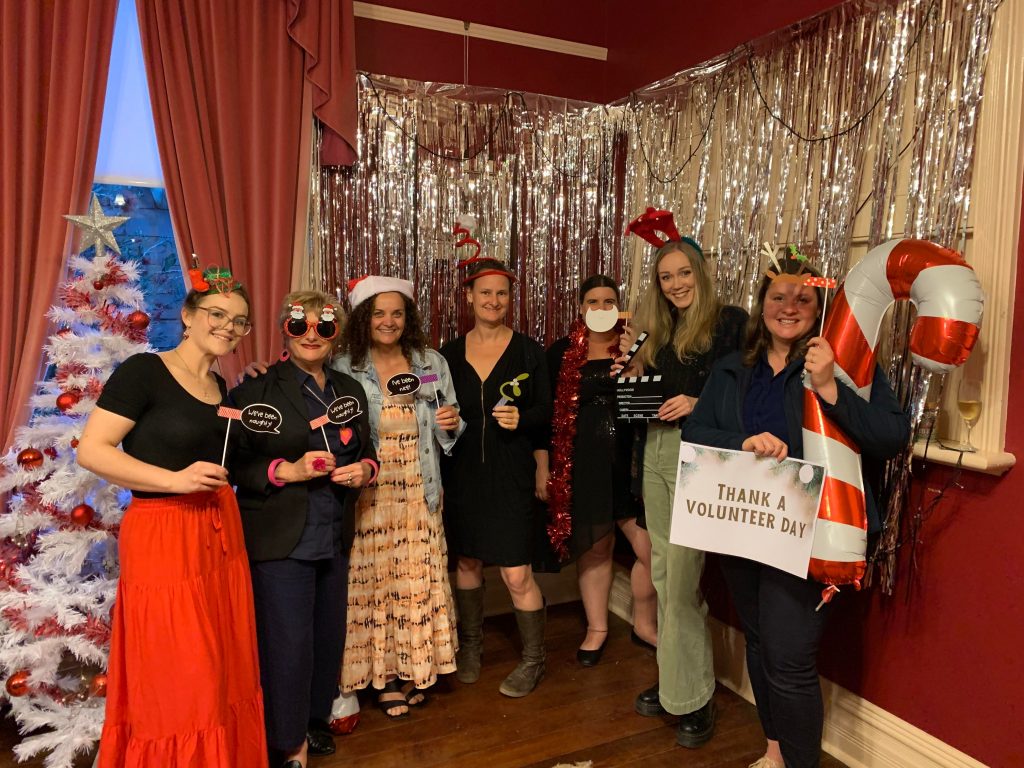Foundation for Rural & Regional Renewal (FRRR)
Grants up to $20,000 on offer
Remote, rural and regional communities across Australia can apply now for grants up to $20,000 for community-driven mental health and wellbeing projects, through FRRR’s In a Good Place (IAGP) program.
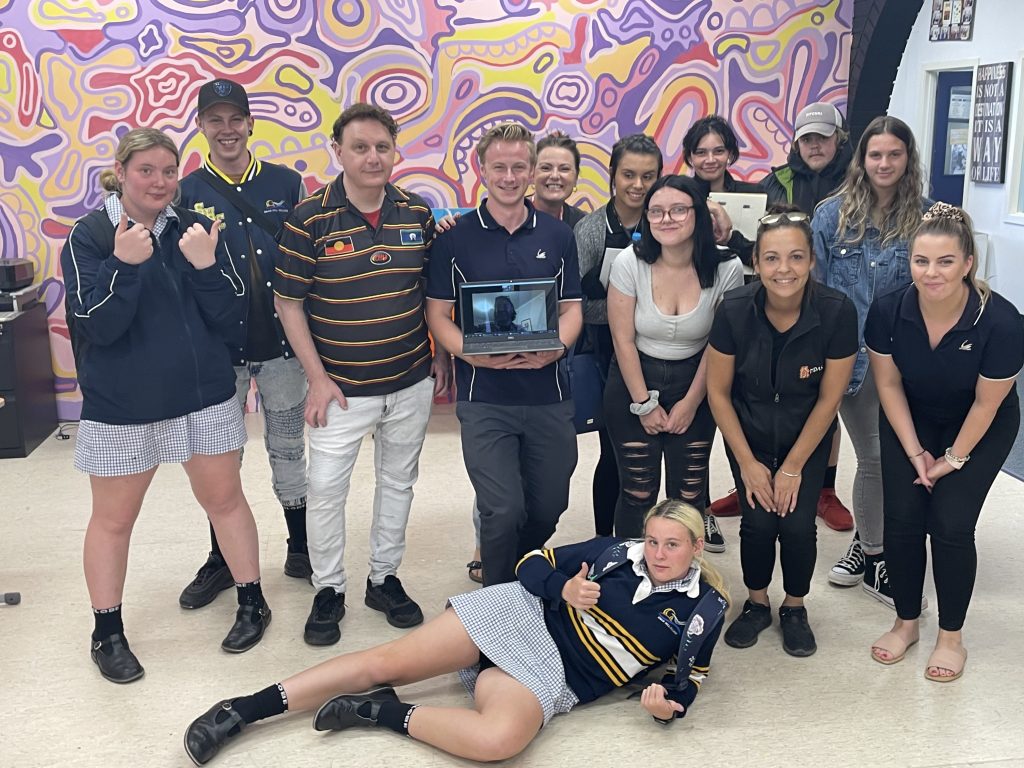
Community groups are invited to apply for up to $20,000 to support activities that empower locals to talk, connect, learn, participate and foster help-seeking behaviours.
FRRR and CCI Giving are offering $250,000 in IAGP grants, a boost of $50,000 on prior grant rounds, thanks to a new five-year partnership.
Jeremy Yipp, CCI General Manager, General Insurance Claims and Chair of CCI Giving, said that since partnering with FRRR in 2018, CCI Giving has seen the direct impact made to 53 mental health-focused projects funded across remote, rural and regional Australia.
“Seed funding is critical for the smaller community projects so that they can develop a proof of concept for their activity model and see what works and what doesn’t, and why. Without assistance from grant programs, such as In a Good Place, these projects may never have the opportunity to really get off the ground and reach their full potential,” Mr Yipp explained.
Jill Karena, FRRR’s People Programs Portfolio Lead, said that, now in its sixth year, the In A Good Place program continues to provide vital funding to support the mental health and wellbeing of communities across remote, rural and regional Australia.
“Projects funded through the In a Good Place program typically bring people together, sometimes to heal, always to learn.
“The program has a definite and important role to play in supporting rural communities in reducing the stigma surrounding mental health and help-seeking behaviours. It helps to bring mental health and wellbeing out in the open – making it OK to talk about and OK to reach out and ask for help,” Ms Karena said.
Applications opened on 12 April 2023. There is a two-stage application process. To get started, a brief Expression of Interest must be submitted no later than 5pm AEST, Wednesday 17 May 2023. Full details are available on FRRR’s website – https://frrr.org.au/in-a-good-place/. Applicants can also call 1800 170 020.
Many regional students face a range of challenges and barriers to post-secondary education, including financial disadvantage, greater travel distances, and limited choice. In Broken Hill in Far Western NSW, fewer than 45% of year 12 students attended university, which is well below 80.3% of their metropolitan counterparts (Source: https://profile.id.com.au/).
In 2021, the Heywire Ideas Lab was held in Broken Hill, due to the cancellation of the Canberra Summit because of COVID. Broken Hill was chosen as the location because of the high number of Heywire competition entries from the community each year.
Twenty-seven students from Broken Hill High School spent a week at the inaugural Broken Hill Ideas Lab. In an incredible week full of storytelling, on-air interviews and developing ideas for change, Broken Hill youth had their voices amplified, and developed five exciting ideas to champion positive change for youth across Australia.
Common line of questioning sparks idea
Young people are asked almost daily what they want to do with their life, and what their future plans are – questions that can be overwhelming, particularly when you don’t yet know what careers are even possible. Even if you do, how do you get there? How can you connect with experts in the field and find the right contacts to start your dream career? It was this challenge that Ella, Angel, Kloe, Ellie & Emerson set out to address, coming up with the Discover Your Future project idea during the Ideas Lab.
Far West University Centre (UC) attended the ideas pitch and were so inspired by the Discover Your Future idea that they decided to work with the youth team to make it a reality in Broken Hill.
The idea and the voices of youth continued to be at the centre of the development and delivery of the project. The group took part in all stages of the project lifecycle and worked collaboratively with UC staff to implement the project.
Helping young people make decisions about their post-school life
With the help of a $7,269 FRRR ABC Heywire Youth Innovation Grant, funded by Findex Community Fund, Far West UC was able to collaborate with two of the initial group members to host a Discover Your Future event, aimed at giving young people a chance to explore and learn more about their future career options.
This day-long event held in May last year was an amazing opportunity for students from Broken Hill High School and Willyama High School to connect with local professionals and industry experts to learn about career paths in Far West NSW.
Close to 150 students were joined by 30 local professionals across 15 organisations, who provided an insight into a vast array of careers and employment opportunities. The day also created connections and increased young people’s confidence in seeking support to navigate post-school life.
Students reported feeling motivated to keep exploring different career opportunities and said that they learned about new careers that they had not considered before.
“It’s definitely helped a lot of the people here today already, that have come through. They are really excited about things that they could possibly go into,” said Emerson, co-creator of the Discover Your Future idea.
Industry participants reflected on how the day was incredibly successful due to its youth-centric, youth-driven approach with a platform for equal voices for youth.
“It’s great to see young people so engaged in a different way than we normally do around careers. It’s open, and they have the opportunity to talk and ask questions, and at the same time giving us some great information about what they want in Broken Hill,” said Dionne, from Broken Hill Council.
From Ideas Lab to reality …
Far West UC said that the grant made it possible for them to bring the project to life and stay true to the original intent of the project idea. Funding covered venue hire, catering, videographer and photographer, marketing and advertising, and resources for activities.
Ensuring that the event met the needs of the young people and keeping them involved as event organisers was critical to the success of the project.
“We didn’t think anything would happen with it. Like we just thought it would be something we thought of and created but we didn’t think it would actually come this far to like the actual day now, it feels very surreal,” Emerson said.
Mutually beneficial relationships created
Far West UC is pleased to have developed a strong relationship with youth and is looking at further opportunities to work together in supporting local youth to explore initiatives to improve youth self-efficacy in navigating post-school transitions. Furthermore, through consultation and collaboration with high school partners the Discover Your Future team was successful in coordinating the attendance of students from year 10, 11 and 12 from both local high schools.
Danielle Keenan from Far West UC said that while the primary aim of the project Discover Your Future was to increase the visibility of career and education options within our region, it also moved to address wider community issues such as the retention of young people, workplace development, economic growth and social outcomes.
She also said that feedback from industry evaluations suggests the event was seen as a worthwhile experience for the local industry, with 86% of survey responses stating that they would be likely or very likely to attend another event. An anonymous quote from the evaluation survey captures the positive feedback: “This event was extremely well executed. The Discover Your Future event engaged young people in a variety of interesting and exciting ways which kept the energy level of the participants high and created an opportunity for more open dialogue during the career engagement section of the session”.
Most importantly, almost 80% of students who completed the post-event survey (67 responses) said they have learned about new careers that they have not considered before.
Danielle said, “The success of the event hinged on the solid and diverse engagement of the community across multiple employment sectors and education stakeholders. The project team developed a strong communication strategy that was able to highlight the mutual benefit of professional involvement in the careers networking event. Subsequently, the project also proved to be an innovative and creative contribution to bolstering the community’s workforce attraction and youth retention strategies.
“In turn, Discover Your Future was able to increase exposure to a vast array of careers and employment opportunities and increase young people’s confidence in seeking support to navigate post-school life.”
According to Beyond Blue, one in seven Australians will experience depression in their lifetime. For people living in remote, rural and regional areas, access to adequate physical and mental health care can be tricky. In fact, getting people to talk about mental health issues can be just as hard as finding the appropriate support.
Organisations like Active Farmers are working hard to breakdown the stigma surrounding mental health and raise awareness and understanding of the benefits of regular exercise and healthy eating. One way they do this is by hosting events like the Active Farmers Games.
In 2019, the inaugural Active Farmers event was held in NSW, and again the following year. Both events were a total success with people travelling from all over the country to attend. Post-event feedback strongly endorsed running it again, but suggested it should head to Western Australia.
The small town of Torbay, located in the Great Southern region, was selected to host the Games. The region is dominated by farmland, which produces livestock, dairy, wool and grows crops. Known as one of the most productive cereal grain and pastoral areas of the state, they have also been severely impacted by drought, bushfires and of course COVID-19. On top of this, the population of the Great Southern area of WA is predominantly aged over 50 years, with the proportion of adults aged over 65 years projected to increase by 54% over the next five years. For people in this age group, physical health concerns can often be managed by regular physical activity and exercise. This demographic also has a large population that lives in regional Australia, where they may lack access to health and wellness services due to remoteness.
The one-day event involved traversing a 3.5km farm-inspired obstacle course (think hay bales, tyre stacking and fence climbing!). The aim was to raise awareness of the importance of physical and mental health and to promote connectedness in the bush. The course was designed to symbolise real life obstacles and how we are able to better overcome these obstacles if we have a team of people around us.
In total, there were 30 obstacles that 150 participants had a go at. There were three teams that consisted of men, women and children. The course was designed to accommodate everyone with the youngest participant being six years old and the oldest participant in their 70s. The event was also a tremendous show of community participation with 40 volunteers to help things run smoothly and another 90 spectators who came to cheer the participants along.
Using a $6,340 Strengthening Rural Communities (SRC) grant, funded by FRRR, Active Farmers were able to host a successful event that fostered a strong sense of connection and joy within the community and surrounding areas.
They were also able to raise much needed funds to establish the Active Farmers group fitness classes in up to six additional locations in WA. Check out this fantastic video that showcases the day’s activities.
In this quarter’s update for FRRR’s donor partners, read about:
- Official opening of First Steps Count in Taree, NSW
- A new Giving option
- Bushfire Recovery, three summers on
- Insights from the Bush
- Our Progress – Q2 FY 2022/23
- Partnering opportunities in youth and education
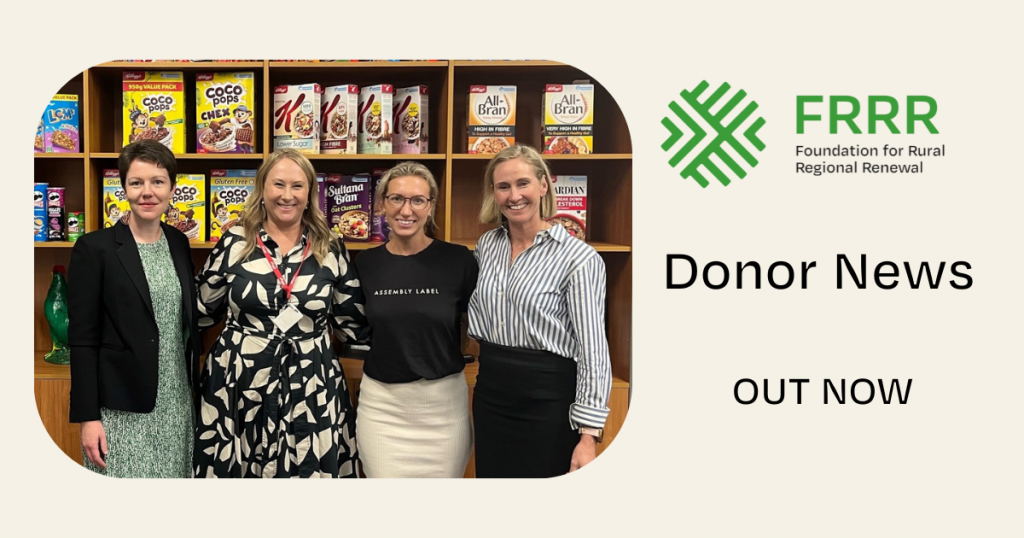
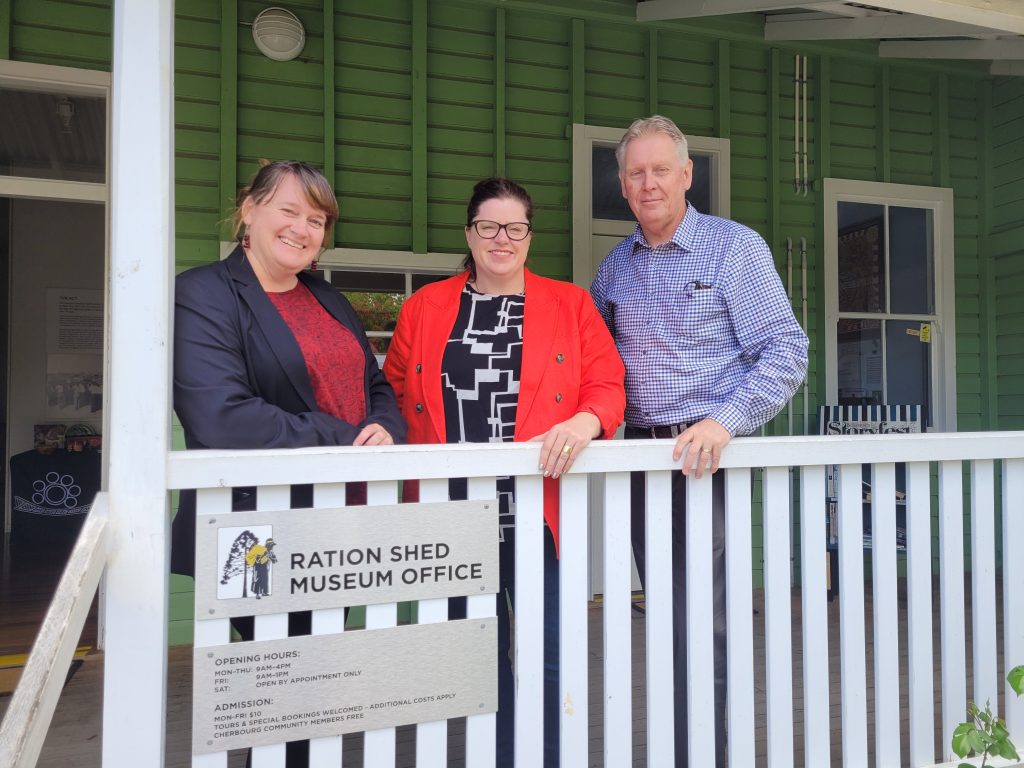
A new initiative to enable Burnett Inland communities to be disaster resilient and future ready has begun to roll out.
The three-year project is a collaborative delivery approach between Red Earth Community Foundation and the Foundation for Rural & Regional Renewal, in partnership with the Minderoo Foundation and the Australian Government.
Almost $982,000 has been provided by the Australian Government, through the National Emergency Management Agency, under the Preparing Australian Communities Program – Local Stream. This funding is part of the $150 million awarded for 158 projects across Australia that are improving the resilience of communities against bushfires, floods and tropical cyclones. In addition, Minderoo Foundation is contributing $1,895,737.
The Disaster Resilient: Future Ready Burnett Inland initiative will mean that local community members, grassroots community organisations and community networks across the region can develop and lead initiatives that strengthen their awareness, increase their preparedness, and enhance their capacity to thrive and be resilient to the impacts of climate, natural disasters, and other disruptions.
Partnering communities will have access to flexible funding for activities that support their community innovation and design process, as well as the activation of ideas and actions.
Melinda Jones, General Manager, Red Earth Community Foundation says that the focus is very much on community-led resilience-building activities – with the agenda and solutions driven by local people, for local people.
“There’s been a lot of talk about the different things that we could do to ensure that our region is better prepared for, able to respond to and recover from natural disasters. This initiative will give us the chance to agree on exactly what those things are and then work together to put the strategies and tactics we develop into action at a grassroots community level.
“The role of Red Earth will be to act as the local program coordination point. We’ve already had input into the program approach and as we move into implementation, we’ll coordinate program activities, ensuring Burnett Inland communities and regional stakeholders have the chance to get involved. But our key role will be to ensure that all aspects of the project bring value to the Burnett Inland region and add capacity to existing systems, processes, and local work to date,” Ms Jones said.
FRRR’s Disaster Resilience and Recovery Lead, Nina O’Brien, said FRRR is delighted to be working closely with Red Earth to implement the Disaster Resilient: Future Ready program in the Burnett.
“From our work with remote, rural and regional communities over the last 22 years, we know that every place is different – and even within a region, there are nuances and different needs. We also know that locals usually have the answers to the challenges around preparing for and responding to our changing climate.
“That’s why we are excited to bring this program to the Burnett. The generous support of the Minderoo Foundation, who bring an adaptable approach towards community resilience planning, means that we can take the time necessary to have conversations in each community, co-design strategies and solutions and, importantly, to activate the ideas and actions that have been collectively prioritised to strengthen resilience to cyclone, flood and other climate impacts.
“Having piloted this model in regional NSW and now working with several communities in Victoria, we know the processes, strategies and actions will look different in each place. In some places, it might include things like workshops to increase understanding of resilience, or strengthening connections within the community, or enhancing local knowledge of climate risks specific to your area or small locality. In other places that might all exist and what’s needed is a clear strategy for adapting to change and disruption, or a focused effort on disaster preparedness that adds value to existing systems and processes.
“Whatever it is, our team will be there to support the local community in prioritising, developing, testing and implementing those ideas,” Ms O’Brien said.
Matthew Chesnais, Resilient Communities Mission Lead at Minderoo Foundation’s Fire and Flood Resilience initiative, believes the project is critical for the region.
“The communities in the Burnett Inland each face different opportunities and challenges. We look forward to working with Red Earth Community Foundation and FRRR to reference the Resilient Communities Framework as part of the project to help the communities consider a systemic and inclusive approach towards their resilience planning.
“Our mission is to strengthen the resilience of identified communities at risk of disasters and we hope to take the learnings from this project and share them nationally to help other communities be disaster resilient,” Mr Chesnais said.
Another stream of the initiative will be to support collaboration across regional agencies and organisations and the development of regional level resilience building initiatives for collective impact.
Find out more about the DR:FR Burnett Inland program and sign up here to receive regular updates and be notified about how you can get involved.
Local NFP leaders invited to join a roadmapping workshop
The Foundation for Rural & Regional Renewal (FRRR) and Bega Valley Shire Council are pleased to announce the start of a new initiative under the $1.3 million Australian Government Black Summer Bushfire Recovery Grants Program.
Investing in Rural Community Futures (IRCF) Bega Valley – Resilience Connection and Place Project builds on the work done over the last year through FRRR’s Investing in Not-for-Profit Capacity in Regional NSW (INFPC) program.
IRCF Bega Valley will support not-for-profits (NFPs) by strengthening their capacity to service local communities through a mix of on-the-ground support, using local facilitators and access to workshops and training.
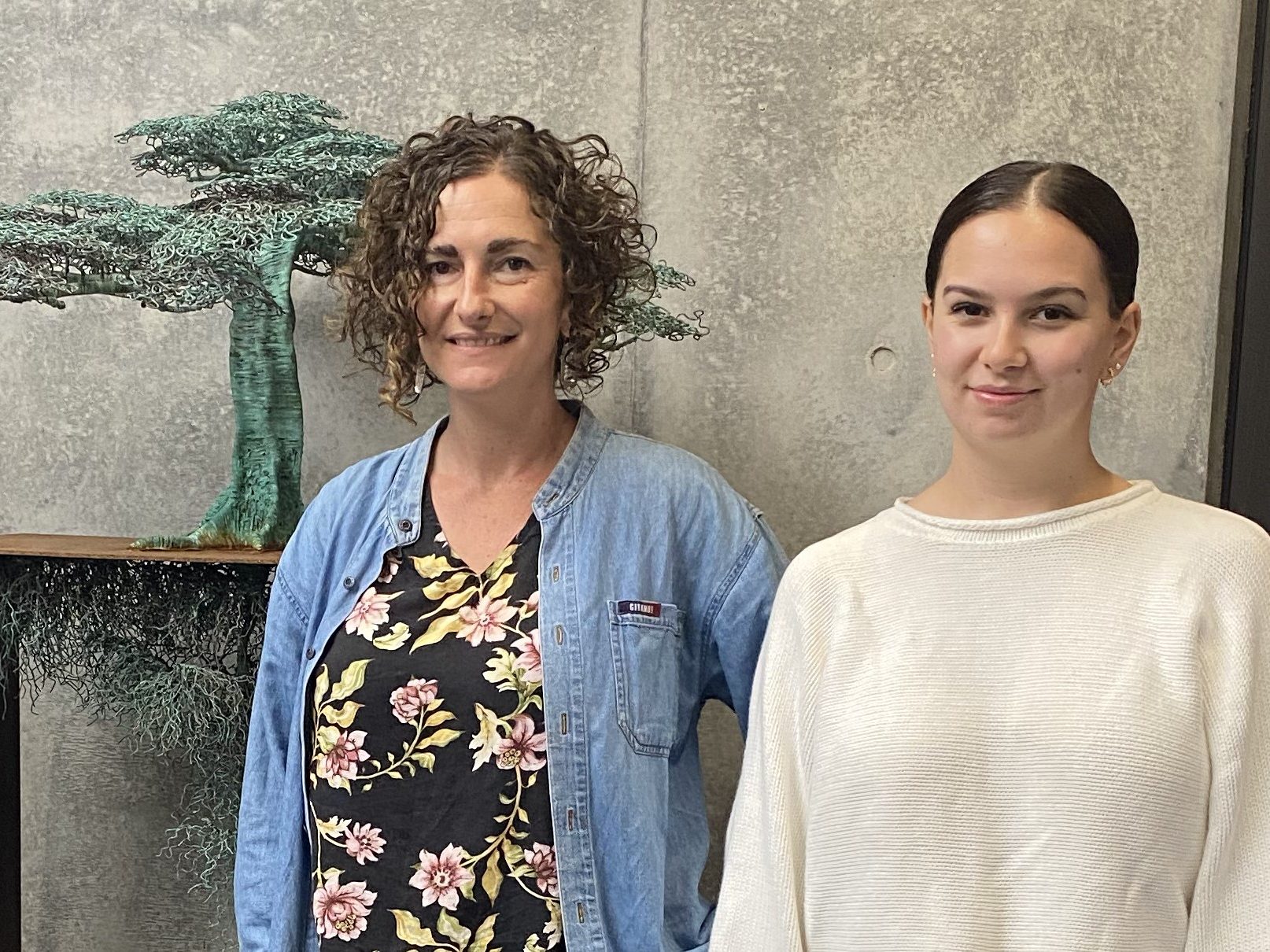
Bega Valley Shire Council is hosting two part-time facilitators, Leah Szanto and Bree Morgan. The facilitators will be connecting with groups across the shire to identify ways in which the local NFP sector can strengthen and adapt to changing community needs in order to thrive. NFPs will be invited to participate in a collaborative planning process aimed at building their capacity and ensuring the sustainability of individual organisations and projects through networking, skill development and community-led initiatives.
The IRCF model is currently being implemented in seven other communities across NSW. A key element is a road mapping process where goals and priorities are decided by the community, for the community. Work has already been done on this through the INFPC program over the last 12 months and now a roadmap will be designed at a workshop in Bega on Tuesday 14 March at 9:00 am. All local NFP leaders are invited to attend and registration is essential via https://frrr-bvsc-workshop.paperform.co/.
FRRR’s IRCF Program Coordinator, Carolyn Ardler, said this locally co-designed program will help the Bega Valley become even stronger than it was before the bushfires.
“It’s been great to see support being channelled into Bega Valley communities following the Black Summer bushfires, but we have also heard that it’s been overwhelming in many respects,” Ms Ardler said. “This new program will allow NFP community organisations and local leaders to work together to identify gaps in their capacity that may be hampering their ability to make the most of the funding and support that they have access to.
“It will also strengthen connections between NFP organisations and other communities where it operates. We’ve seen groups collaborate on projects that are truly transformational for their community, so it’s exciting to see the program kicking into gear.”
Council’s Community Development Coordinator, Chani Keefer, said it was great to be partnering with FRRR on this program.
“The goal of IRCF Bega Valley isn’t just to recover from the bushfires, but also to make our community stronger for the future,” Ms Keefer said. “This model will allow local community leaders to prioritise where they need to build their skills and capacity so they can work collectively towards a socially, economically and environmentally stronger Bega Valley.
“Having local facilitators on-the-ground has proven to be critical in other communities where this model has been implemented.”
To find out more about the IRCF program or to get involved, visit ircf.frrr.org.au/Bega or contact FRRR Carolyn Ardler, IRCF Program Coordinator – South Coast on 1800 170 020.
Community groups and NFPs can apply for up to $10,000
FRRR has announced the opening of the first round of Telstra’s Connected Communities Grant Program.
The aim of the program is to boost remote, rural and regional communities resilience, environmental sustainability and liveability.
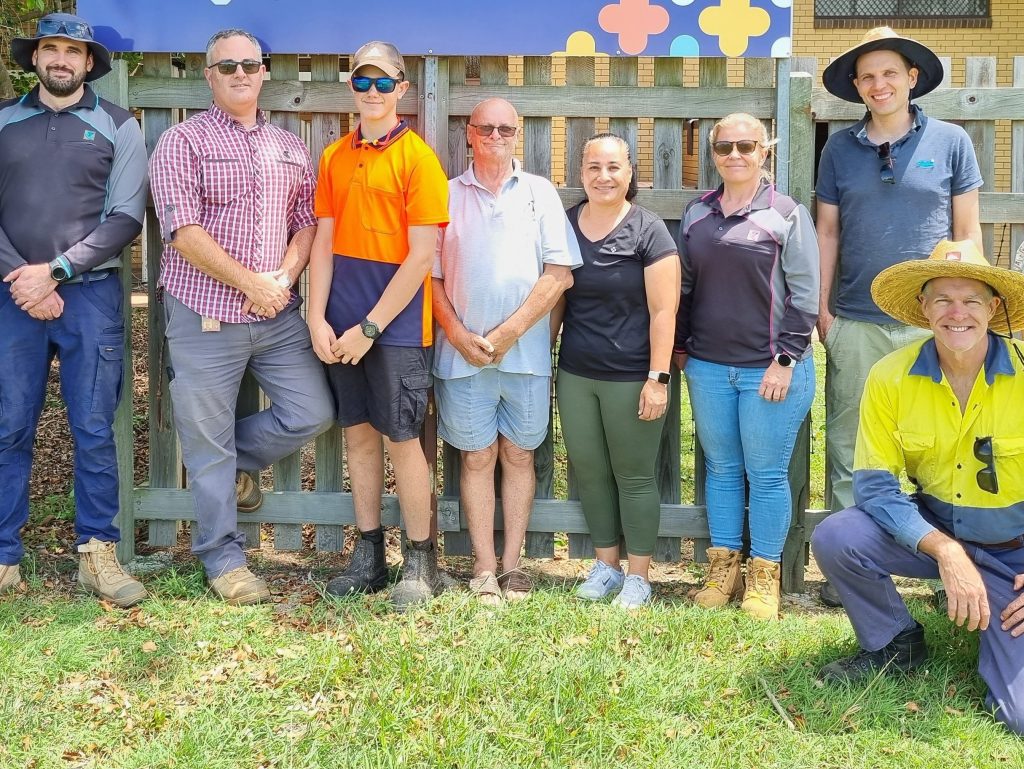
Telstra has committed to funding this grant program until 2025. The annual commitment of $200,000 will make grants up to $10,000 available for not-for-profit community organisations that provide access to information, technology, education and facilities for the purpose of building both social capital and digital capability.
The new program has three goals. To foster:
- Resilient communities that are well prepared and socially connected when disaster strikes with the ability to renew and recover together;
- Sustainable communities that are diverse and inclusive, planning for the health, wellbeing, and prosperity of their people and the planet; and
- Liveable communities that have digital capability and help to equip individuals with the skills to live, learn and work in a digital society.
Loretta Willaton, Regional Australia Executive and Regional Customer Advocate at Telstra said the program is all about keeping people connected in a range of ways, both online and offline.
“At Telstra, we know how important it is to keep people connected. The last few years in particular have shown everyone the importance of connectedness within our communities. Rural and regional Australia has been doing it particularly tough in recent years and so we wanted to do our part in helping the country to rebuild.
“Obviously one of the best ways to keep people connected is through technology and digital equipment but we know access, understanding and management of these tools can be a barrier. We’ve designed this program to create opportunities for a wide range of projects to address these barriers such as a local event, an educational workshop or not for profit organisations embracing new technology or managing cyber security. We are open to support any kind of initiative that gives people better access to information that will enable a stronger social network, safer online interactions, or access to information for disaster preparedness or environmental sustainability,” Ms Willaton said.
FRRR’s Acting CEO, Sarah Matthee, said that programs like these, help people to maintain their connection to their community and play a key role in many different aspects of life in remote, rural and regional Australia.
“We’re excited to launch the first round of this new program in partnership with Telstra. Our Heartbeat study highlighted a significant digital divide for remote, rural and regional not-for-profit organisations, particularly when it comes to accessing digital resources and the opportunity to improve knowledge and skills to harness technology to maintain and create connections. We know that these connections are so important in strengthening each community’s ability to withstand future disruptions and maximise sustainability and liveability.
“We’re looking forward to applications from community groups that are facilitating local events and community programs that support local communities learning and adapting to change – be it accessing information for disaster preparedness or better environmental practices, implementing better e-waste solutions, boosting cyber-security, and much more” Ms Matthee said.
Applications close Thursday, 30 March 2023 at 5pm AEDT. For more information and the guidelines, visit https://frrr.org.au/telstra-connected-communities-program/.
Potential applicants are encouraged to sign up for an online Grantseeker Webinar for more information about the program and useful tips for applying at 12pm AEDT, Monday 6 March.
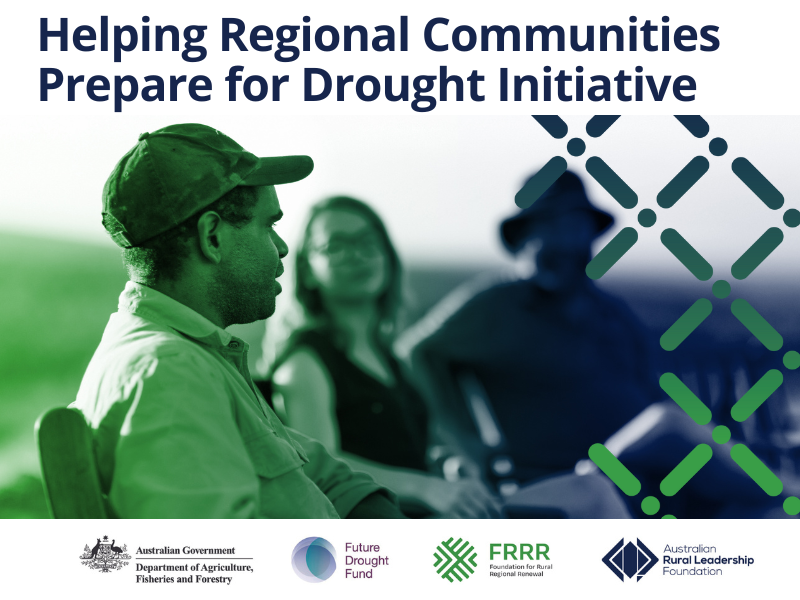
The Foundation for Rural & Regional Renewal (FRRR) and the Australian Rural Leadership Foundation (ARLF) are looking for a local NFP partner to work with them across the Loddon Campaspe region as part of the Helping Regional Communities Prepare for Drought Initiative Community Impact Program.
The region encompasses the Campaspe, Central Goldfields, Greater Bendigo, Loddon, Macedon Ranges and Mount Alexander Shires.
The Initiative is funded through the Australian Government’s Future Drought Fund and designed to help agriculture-dependent communities across remote, rural and regional Australia enhance their preparedness for drought.
The $29.6 million investment over three years builds on the Future Drought Fund’s previous Networks to Build Drought Resilience program (led by FRRR) and the Drought Resilience Leaders program (led by ARLF).
The place-based Community Impact Program is designed to support community members and not-for-profit organisations to drive local action that helps prepare for drought. There are two main components to the program:
- Community Impact Grants: This between $200,000 and $500,000 available and FRRR will work with the lead community organisations to develop, co-design and deliver projects that strengthen community networks, capabilities and facilities that support drought preparedness; and
- Community Leadership Activities: ARLF will offer a range of funded leadership development activities to support community members to develop their leadership skills, and equip them with the networks to respond to drought preparedness in their community.
FRRR’s Disaster Resilience and Recovery Lead, Nina O’Brien, said that this a great opportunity for the communities in Loddon Campaspe to proactively strengthen drought resilience.
“While there has been a lot of flooding in recent months, it’s highly likely that it won’t be too long before drought is on our radar. Rural communities are better able to withstand the impacts of events like drought – and indeed other disasters – when they are strong and well connected. The overall aim of this program is to facilitate increased social connection, strengthen network opportunities and link capacity building opportunities to ensure widespread local benefit, so that communities are better prepared for the future.
“But we know that looks different in each community, which is why we are looking for a local lead partner. They will work with other community members and organisations to identify what local action is most appropriate. FRRR staff will be there to support the process and we’ll also fund a facilitator to work with the community to get the best outcome possible.
“The grants can fund projects, events, initiatives, training, capability building and small-scale community infrastructure projects and we’re really keen to make sure that First Nations communities and younger people are also engaged in drought resilience planning and action,” Ms O’Brien explained.
As part of the program, ARLF will offer a number of optional and complementary Leadership Development Activities at no cost to the successful applicants. These are designed to strengthen the leadership capabilities of communities to build individual and community drought resilience.
ARLF’s Chief Executive Officer Matt Linnegar said that because every lead organisation and region will be at a different point in their resilience journey, ARLF has a number of options that communities can tap into.
“We have five leadership development activities, ranging from intensive residential leadership programs to a series of deep-dives into particular leadership topics to group coaching. Each is underpinned by the concepts of adaptive leadership, resilience and network leadership.
“Applicants will need to include their preference for leadership development activities when they lodge their express of interest for the Community Impact Program, and we will work closely with applicants to refine their preferences as we move through the collaborative project design phase,” Mr Linnegar explained.
Initial expressions of interest close 22 March 2023, with shortlisted groups commencing co-design in their communities in May and funding confirmed in August 2023. Groups will have until June 2025 to implement the projects.
Interested groups can learn more about the program and lodge their EOI by visiting www.frrr.org.au/impact-program.
Ravensthorpe Community Resource Centre (CRC) Inc is integral in coordinating and managing community and business events throughout the Ravensthorpe Shire in Western Australia. They have expanded to the Fitzgerald Business Network, which is focused on connecting and skill building businesses throughout the district including social development activities such as Study with a Buddy After School Program; Seniors Computer Club and major annual events such as Wellness Weekender and Galaxy Country Carnival and Street Parade.
A $5,000 Nutrien Ag Solution Community Grant in 2021 provided the opportunity to improve community organisations’ employee and volunteer management. The grant funded bringing in a local human resources consultant to develop tailored solutions for paid and unpaid personnel in local community groups, run workshops on volunteer management software systems and set up a central register for formal volunteer documents. Additionally, a project manager was paid to plan and co-ordinate the work.
Volunteers are the lifeblood of many communities. However, this is a great example of how funding can temporarily increase organisational capacity to complete work effectively. In this case the original plan of completing one group training was not possible so several sessions had to be coordinated to ensure all local community groups could participate.
There have been some great outcomes:
- Position descriptions and employment contracts were developed for seven community groups or volunteer programs, including the Community Spirit Committee and Ravensthorpe Regional Arts Council.
- A volunteer certificate register was developed and promoted. It has benefited three groups (and will continue to benefit others) who have volunteers that require Working With Children Checks, Responsible Service of Alcohol Certificates and that want to store these certificates in a central location.
- Two workshops on cloud-based volunteer management options were delivered.
Chairperson Tracy Ebert was delighted with the project outcomes. “We have developed a suite of tailored resources for some of our most important local community groups. The volunteers on these groups now feel much more confident to engage volunteers and paid staff knowing that they are meeting all legal requirements. The volunteers have enjoyed having very clear expectations and have remained engaged. There are now at least three other groups in the community using the volunteer software system presented to manage volunteers and the reporting to committees and management of tasks has been vastly improved in these instances.
“And that’s not all,” she continued. “Excitingly, we have been able to provide these resources to a region-wide project – South Coast Enviro Experiences – with similar objectives (as the challenges with managing volunteers are universal), which means they don’t have to reinvent the wheel and can direct their resources into other essential elements of the project which we will benefit from.”
There are learnings in all projects and the Ravensthorpe CRC are conscious of the security of the data they hold on behalf of their volunteers, and have taken all measures for its secure keeping.
Overall, 60 people from Ravensthorpe community organisations directly benefited from the training and presentations, and there is the ongoing benefit to human resource documentation and administration skills to support current and future employees and volunteers in Ravensthorpe.
Around three hours drive from Adelaide, along the beautiful coast, the Southern Yorke Peninsula Community Hub (SYP) is a central organisation that offers a range of services to its community.
From faxing, to printing, to car and boat licenses, the Hub provides tourist information and is home to the local Salt Lakes Gallery. With a role as big as this in the community, it makes sense that the Hub would be crucial during emergencies.
In November 2019, bushfires occurred in isolated rural areas along the Peninsula, putting many towns at risk. The community of Yorketown was in the fire path until a wind change moved it along to then endanger the township of Edithburgh. The fires impacted power supplies, road closures and communications for prolonged periods. The SYP Community Hub supported the community as a response centre throughout this event.
Since the 2019 bushfires, SYP Community Hub has been heavily involved in coordinating disaster recovery services. This included purchasing a custom-built trailer, the first in the Yorke Peninsula Council area. Using a $24,950 Strengthening Rural Communities (SRC) grant, funded by a private donor, the trailer has become a multipurpose community resource.
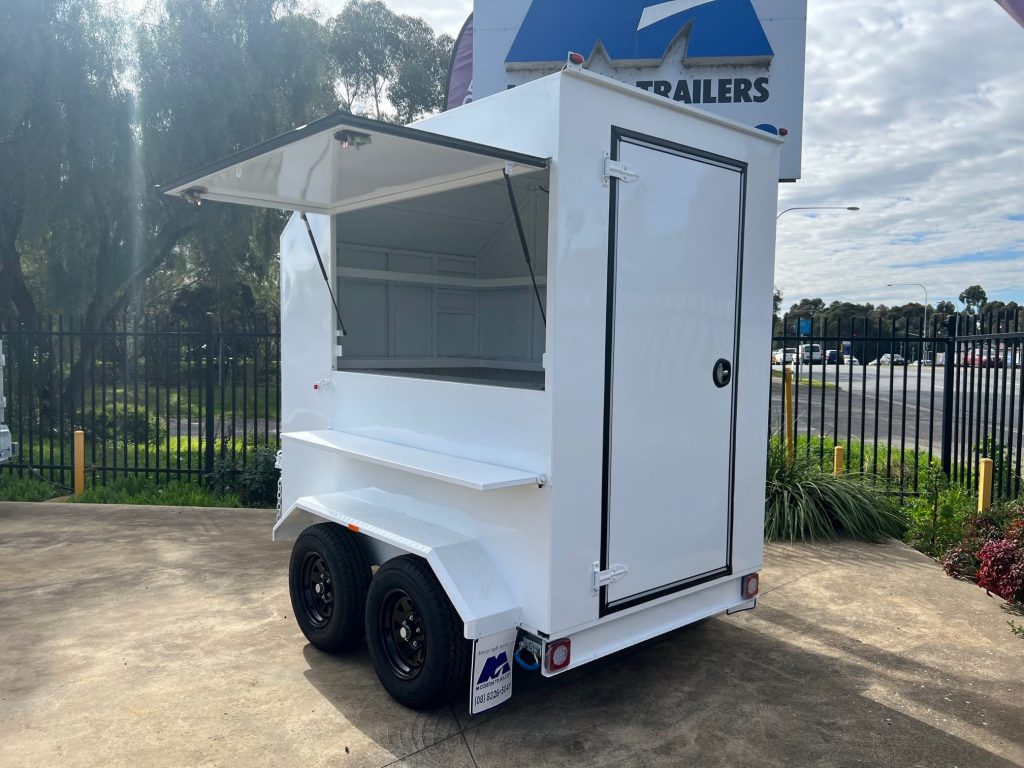
During emergencies, the trailer will enable deployment of supplies such as food, water and basic first aid. It will also assist in distributing supplies to volunteers and act as a rest station during incident response. The versatility of the trailer also means that it can be used during community-led events.
The impact the trailer has had on the community has been exceptional. “The response from residents is one of pride in its completion and the feeling of readiness should they once again be faced with an crisis like the 2019 bushfires. The community is better prepared, trained appropriately and with a strong band of volunteers.”
Like many plans during the last few years, the start of the project was delayed due to COVID. Materials were in short supply and the engineering firm responsible for building the trailer was hit by COVID and forced to close for a period of time. But once they were able to safely get back to work, the trailer came together nicely.

